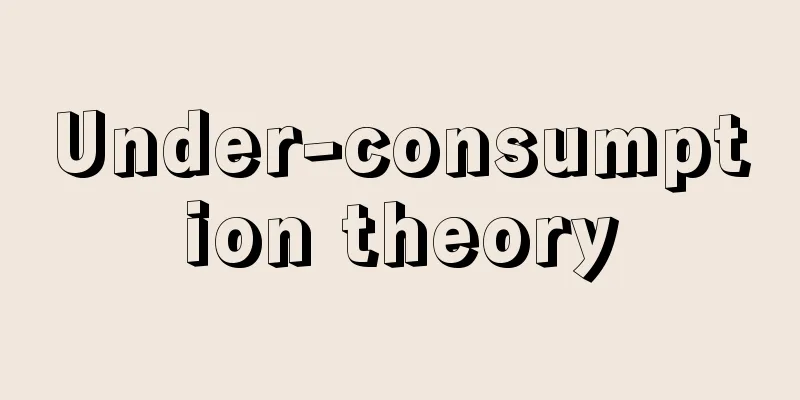Under-consumption theory

|
A general term for the theory that the root cause of the contradictions in the capitalist economy, such as economic depressions and recessions, is the lack of consumption power of the masses. The origins of this theory can be found in the arguments of Sismondi and Malthus, who criticized Say's market theory that "supply creates demand." Sismondi argued that in capitalism, capitalists have a tendency to expand production unlimitedly, while the consumption power of small producers and workers who are exploited by capitalists is limited to a narrow range, so "excess production beyond consumption" inevitably occurs. In order to avoid this depression, he argued that the government needs to limit the anarchic expansion of production by capitalists and to intervene in distribution relations to protect small producers and others. Malthus criticized Ricardo, who inherited Say's proposition, and argued that unproductive consumption by landlords, priests, aristocrats, etc. is essential to make up for the shortage of consumption. During the establishment of capitalism, these two men tried to defend the interests of various classes that were declining due to the rise of the capitalist class based on the theory of underconsumption. Arguments that the lack of consumption power of the masses is an essential flaw and contradiction in the capitalist economy have appeared in many subsequent critiques of capitalism. The Russian Narodniks argued that the development of capitalism itself was impossible in Russia due to a lack of markets, while in Germany Rosa Luxemburg argued that the development of capitalism required external non-capitalist buyers to make up for the lack of demand, which made the establishment of imperialism (= colonial expansion) inevitable, and ultimately the lack of markets made the existence of capitalism impossible. After World War II, Baran and Sweezy argued that in monopoly capitalism, economic surpluses accumulate due to high monopoly profits, while a lack of demand leads to a lack of investment opportunities and the capitalist economy stagnates. All of these arguments are based on the theoretical underconsumption theory. The underconsumption theory touches on one side of the truth that the capitalist economy is different from other economic systems in that the expansion of production is ultimately limited by the consumption power (purchasing power) of the masses. However, the expansion and development of capitalist production is not determined solely by the consumption power of the masses. Although the production of capital goods and its productive consumption (investment demand) are ultimately limited by the consumption power of the masses, they can expand relatively independently for a certain period of time, during which time the amount of employment increases and the consumption power of the masses also rises. It must be said that the underconsumption theory is fundamentally mistaken in that it does not understand at all the role of investment demand in the expansion of capitalist production. If we take the argument of the underconsumption theory to its conclusion, which completely ignores the possibility of an expansion of investment demand and the accompanying expansion of consumption demand and directly attributes income inequality, which is a constant phenomenon in the capitalist economy, to depressions and recessions, we cannot help but consider that the capitalist economy is chronically in recession. It therefore becomes completely impossible to explain why depressions occur periodically or why wages are generally higher just before a depression. The underconsumption theory has generally been taken as the theoretical basis for criticism of capitalism, and the recognition that income inequality and a lack of effective demand are flaws in the capitalist economy can be said to be connected to the idea of modified capitalism such as Keynesian economics. However, modified capitalism theory is fundamentally different from criticism of capitalism in that it believes that these flaws can be eliminated within the capitalist system through income redistribution through tax policy, the improvement of social security, and government policies to create effective demand. [Shuta Sasaki] Source: Shogakukan Encyclopedia Nipponica About Encyclopedia Nipponica Information | Legend |
|
経済恐慌や不況など資本主義経済の矛盾の根本原因は、大衆の消費力が不足することにあるとする理論の総称。この理論は、「供給はおのずから需要を生み出す」というセーの販路説を批判したシスモンディやマルサスの主張にその源流をみることができる。シスモンディは、資本主義では資本家が生産を無制限的に拡大しようとする性向をもつ反面、資本家に収奪されている小生産者や労働者の消費力が狭い範囲に制限されるので、「消費を超える生産の過剰」が必然的におこると説いた。この恐慌を回避するために、政府が資本家の無政府的生産拡大を制限し、また分配関係に介入して小生産者などを保護する必要があるというのが彼の主張であった。マルサスは、セーの命題を継承したリカードを批判し、消費の不足を補うためには地主や僧侶(そうりょ)、貴族などの不生産的消費が必要不可欠であると主張した。この両者は資本主義の確立期に、過少消費説に基づいて資本家階級の台頭によって衰退しつつあった諸階級の利益を擁護しようとしたのである。大衆の消費力の不足を資本主義経済の本質的欠陥・矛盾とする議論は、その後も資本主義批判の議論のなかに数多く登場している。ロシアのナロードニキは、ロシアでは市場不足のために資本主義の発展そのものが不可能であると主張し、ドイツではローザ・ルクセンブルクが、資本主義の発展は需要不足を補うためにその外部に非資本主義的な購買者を必要とし、そのことが帝国主義の成立(=植民地の拡大)を必然化し、そして究極的には市場の欠乏が資本主義の存立を不可能にすると主張した。第二次世界大戦後では、バランおよびスウィージーが、独占資本主義においては、独占的高利潤によって経済的余剰が累積するのに対し、需要の不足が投資先を欠乏させ、資本主義経済が停滞すると論じている。これらの主張はいずれも過少消費説を理論的基調とするものである。 過少消費説は、資本主義経済だけが他の経済体制と異なり、生産の拡大が究極的に大衆の消費力(購買力)によって制限を受けるという一面の真理をついているのである。しかし、資本主義生産の拡大発展は、大衆の消費力によって一義的に決定されてしまうのではない。生産財の生産やその生産的消費(投資需要)は、究極的には大衆の消費力によって限界を画されるとはいえ、一定期間はそれから相対的に独立して拡大しうるのであり、その期間内においては、雇用量も増大して大衆の消費力も上昇するのである。過少消費説は、資本主義生産の拡大における投資需要の役割をまったく理解していない点で根本的な誤りを犯しているといわねばならない。投資需要の拡大とそれに伴う消費需要の拡大の可能性をまったく無視し、資本主義経済においては恒常的現象である所得の不平等などを直接に恐慌や不況の原因としてしまう過少消費説の議論をつきつめてゆけば、資本主義経済は慢性的に不況であると考えざるをえなくなるのである。したがって、恐慌が周期的におこる理由や、恐慌の直前には一般的に賃金が高水準にある理由などはまったく説明できなくなるのである。 過少消費説は一般に資本主義批判の理論的根拠とされてきたのであるが、所得の不平等や有効需要の不足を資本主義経済の欠陥とする認識は、ケインズ経済学などの修正資本主義の考え方にもつながっているといえる。しかし、修正資本主義論は、租税政策による所得の再配分や社会保障の充実、さらに政府の有効需要創出政策などによって、これらの欠陥を資本主義体制内において解消しうると考える点で、資本主義批判論とは本質的な相違がある。 [佐々木秀太] 出典 小学館 日本大百科全書(ニッポニカ)日本大百科全書(ニッポニカ)について 情報 | 凡例 |
<<: Burn shock death - kashoshokushi
>>: West Temple of Kashoji Temple
Recommend
Pygmy chimpanzee
A primate ape of the orangutan family (illustratio...
component stereo system
...This distortion is called intermodulation dist...
Koprivštica (English spelling) Koprivstica
…Because the independence of the Church included ...
Cultural property
The term "cultural properties" was not ...
Freeholder (English spelling)
Freeholders. A class of freehold landowners since ...
Zokuso - Common Koto
〘Noun〙① A type of stringed instrument. Refers to o...
Tamotsu Takada
Playwright, director, novelist, essayist. Born in...
Iron paste - Kanetsuke
1. To blacken one's teeth. This refers to the ...
Bucktooth conger
This marine fish belongs to the order Anguillifor...
Antarbasa - Antarbasa
…It is also called san-neippattsu. The three garm...
Archaeopteryx - Archaeopteryx
…The classification of birds varies among scholar...
Takakuraji
A local lord of Kumano who saved Emperor Jimmu fro...
Jade Cup - Gyokuhai
A sake cup made of a ball. Also, a beautiful name ...
FAO Annual Report on Agricultural Production
…Furthermore, in November 1996, the World Food Su...
Regular savings - teikitsumikin
A fixed term installment is a contract in which a ...









